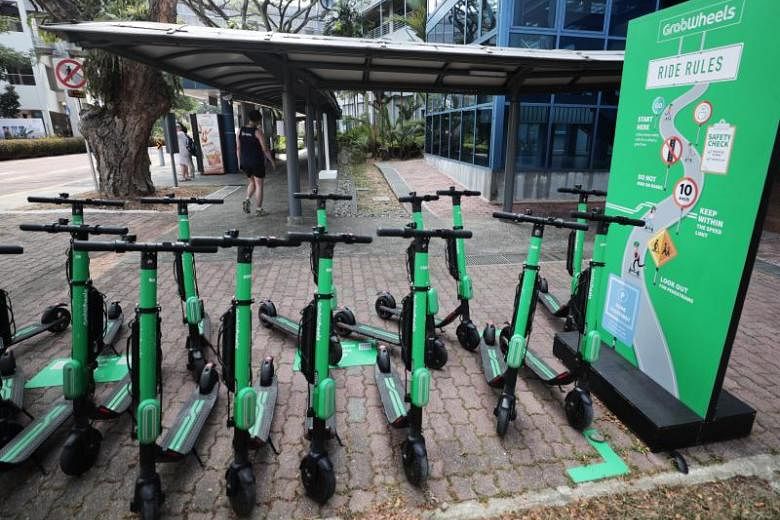SINGAPORE - New rules have been introduced for users of the GrabWheels trial e-scooter service at the National University of Singapore (NUS), after a week-long safety timeout was called following a spate of injuries.
When the safety timeout is lifted on Saturday (March 16), GrabWheels users will have to undergo mandatory training conducted by vendors approved by the Land Transport Authority, as well as don helmets when using the e-scooters among other new measures.
The new rules were disseminated via an internal circular - seen by The Straits Times - from Dr Peck Thian Guan, director of the Office of Safety, Health and Environment, and addressed to staff and students on Friday.
The helmets will be available at all 28 GrabWheels parking locations. Users can sign up for training on the GrabWheels app from Saturday and only those who have passed a proficiency assessment will be allowed to use the service.
Each training session will take around 30 minutes to complete and will include the basic dos and don'ts of riding an e-scooter as well as hands-on training on riding the two-wheeler properly and on slopes, said Grab.
At the end of the session, participants will also go through an assessment to test them on what they have just learnt.
The circular also mentioned that closed-circuit TV surveillance will be stepped up on campus to catch errant riders, who may then be banned from using e-scooters on campus.
For users like Mr Johan Ng, an NUS communications and new media student in his final year, the new rules bring inconvenience.
"I don't mind the training since I heard free Grab credits may be given, but sharing helmets can be disgusting, even if they are cleaned daily," said Mr Ng, 24, who uses the e-scooter to make the occasional eight-minute trip on the two-wheeler from University Town to the Central Library.
"If they really do enforce the helmet rule, I will just walk or take the bus instead," he added.
The trial was launched last December at the Kent Ridge campus to let Grab and NUS study the feasibility of using e-scooters as another way of getting around the 150 ha campus.
A January survey by NUS showed that more than 96 per cent of students like the initiative and close to 80 per cent of users use the service between one and four times a week.
However, while the trial was popular, with more than 100,000 trips completed in the first two months, it also resulted in a number of injuries. An NUS spokesman had told ST that a small number of injuries needed hospital treatment and one case involved "a more serious injury".
During the timeout, safety measures such as roadshows and safety education programmes were conducted for students. Traffic measures, called "rumble strips", were also installed on slopes to remind e-scooter users to slow down.
NUS will also hasten construction of a dedicated personal mobility device lane and pavement improvement works on campus, said the circular.
Some students like Miss Choo Yingci, 22, a final-year literature student at NUS, approve of the measures.
"I think improvements to the infrastructure would be very helpful because right now users are scooting among crowds and quite quickly too, which may be dangerous," she said.
ST has reached out to Grab for further comment.


